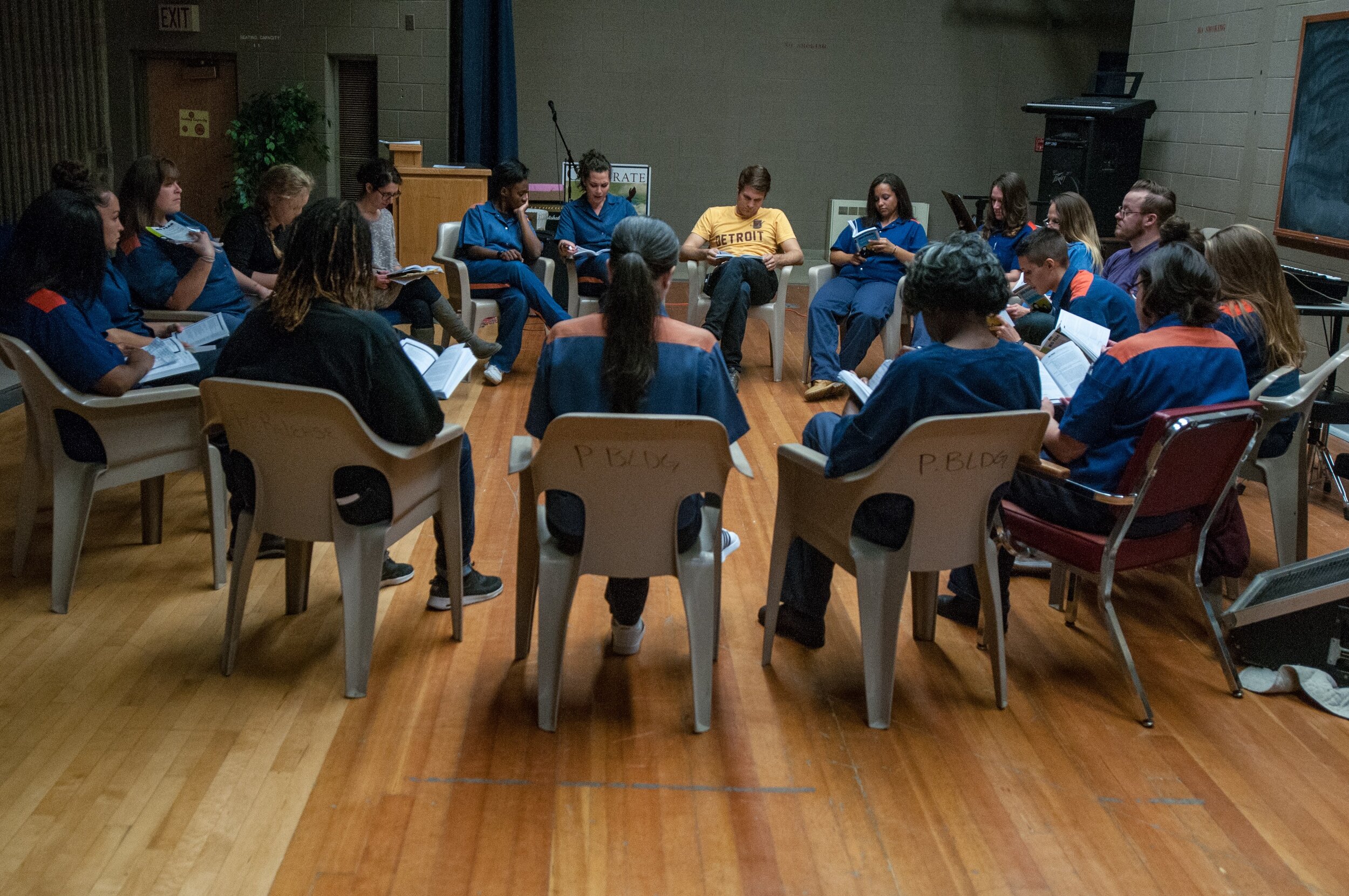“That sense of trust just kept bringing me back.”
Tuesday / February 11 / 2020
Written by Maria
Today we continued our design conversation from last week, briefly going over how to do some script analysis to help determine what props and costumes are called for in the show. We then asked, “Why do we think that Shakespeare didn’t write the Ghost into the final scene?” We’ve been toying with the idea that the Ghost might play a larger role in our performance.
“There’s such an emphasis on the death of Hamlet. The ghost takes away from his death,” one woman said. “Maybe the ghost was a hallucination for [Hamlet],” a woman who is relatively new to the group added. “The ghosts don’t exist in this reality unless they need to,” agreed a third woman. “I just keep thinking of Star Wars VI,” one woman said, laughing, while we all pictured the ghosts congregating around the fire while Ewoks celebrate. Although it’s not exactly the right tone for the end of Hamlet, we understood what she meant, and we decided that when we get to staging the final scene we will try both ways (with and without the Ghost) to see which we like better. This same woman reminded us that “it’s easy to make decisions when we go one scene at a time, [but] maybe when we see the whole thing we’ll feel differently.”
After being seated for so long, Emma asked if anyone wanted to play a game. Some people excitedly agreed, but no one really seemed to know what to play until our wonderful resident “stage manager” chimed in that we had all the people available to do 4.1. We decided to jump ahead and look at that short scene, in which Claudius and Gertrude are talking with Rosencrantz and Guildenstern about what to do with Hamlet. He has just killed Polonius, and Gertrude is still reeling from the accusations thrown at her from her son. Our Gertrude was sitting in a chair center stage, frozen, as Claudius circled around her trying to get her to tell him what was wrong.
We finished the scene and asked how it felt, which prompted Claudius to say, “I feel like he should sit down in the end. He’s a little bit more personal.” Kyle then asked Gertrude, “What are you feeling, and what do you want in this scene?” She responded that she’d be in shock, trying to stay calm after her son just killed someone in front of her. “But I would still be on my son’s side. I want to protect [Hamlet].” Now that we had pinpointed Gertrude’s objective, we moved on to Claudius. What did he want in this scene? “To make Gertrude feel better,” Claudius responded. “This is one of the few times Claudius shows his feelings for Gertrude, but then he gets mad.”
“And does either Gertrude or Claudius get what they want?” Kyle asked. “No!” they both energetically replied. With that in mind, we jumped into the scene again. Their opposing desires created dynamic tension. The scene was already so much better!
After the second time through one woman in the audience asked, “How are you playing Getrude?” “I’m in between. I just don’t know who I want to believe, the man I just married or my son,” Gertrude responded. This made us realize that it was really hard to start the scene without the buildup of Hamlet killing Polonius, throwing accusations at Gertrude, and seeing the Ghost, so we doubled back to the last part of the previous scene. We didn’t have our Hamlet at that moment and no one wanted to read the role, so I jumped up. It’s not every day that I get to play the melancholic Dane!
It was clear from the beginning of getting into 4.1 again that Gertrude was conflicted emotionally, and it was also clear how quickly everything moves! Hamlet is dragging the body of Polonius out the door just as Claudius enters from the opposite side of the stage. Poor Gertrude has no time to plan or piece together everything that has just happened to her.
We decided to skip 4.2 since it’s so short, and we moved into 4.3. The text says that Claudius enters with a few attendants, but we tried it with Claudius speaking directly to the audience. Rosencrantz and Guildenstern bring Hamlet to the King to force him to reveal where he stowed Polonius’ body. After we finished the first time, Kyle asked who the most important person in the scene was. A chorus of “Claudius!” rang around the auditorium (I tried not to take it too personally).
Kyle said that we needed to bring Claudius downstage to make him a focal point of the scene. “Actually, I think we wanted to try this scene in front of the curtain,” I said, winking at our stage manager, who had suggested the idea earlier to me. I ran backstage to close the curtain and readied to return again as an obstinate jerk to Claudius.
With the curtain closed, we were forced to enter from the house door with Claudius standing on the stage, already at a higher playing field of power and authority looking down at us. It made it so much more impactful when crossing to Claudius. Instead of just walking over to the King, I got to ascend the steps to completely disrespect him to his face.
“I like it with the curtain closed. I like where for that last part [Hamlet] got on this level,” our Claudius said after we finished the scene. I enthusiastically agreed with her. I loved doing it, too! “It condenses the stage and makes their presences more intimate,” an audience member said. With only a few minutes to spare I turned to the woman playing Fortinbras and commented on how great it will look in the next scene when we open the curtain on her entrance with her army.


